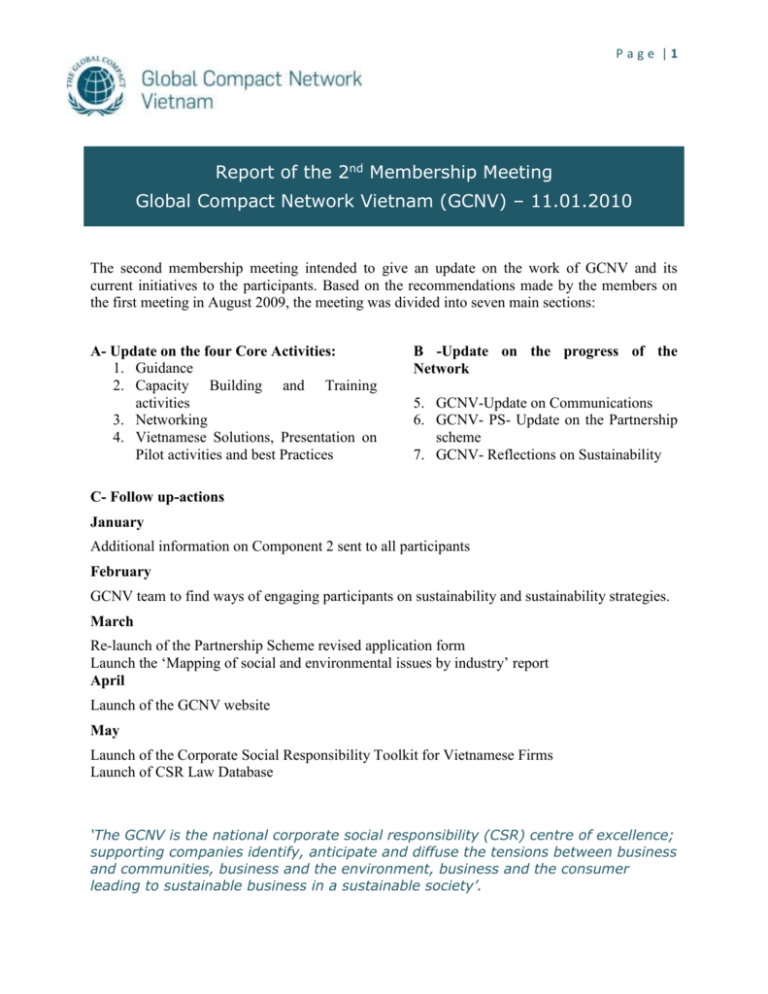Report_of_II_Membership_Meeting_25_1_2010
advertisement

Page |1 Report of the 2nd Membership Meeting Global Compact Network Vietnam (GCNV) – 11.01.2010 The second membership meeting intended to give an update on the work of GCNV and its current initiatives to the participants. Based on the recommendations made by the members on the first meeting in August 2009, the meeting was divided into seven main sections: A- Update on the four Core Activities: 1. Guidance 2. Capacity Building and Training activities 3. Networking 4. Vietnamese Solutions, Presentation on Pilot activities and best Practices B -Update on the progress of the Network 5. GCNV-Update on Communications 6. GCNV- PS- Update on the Partnership scheme 7. GCNV- Reflections on Sustainability C- Follow up-actions January Additional information on Component 2 sent to all participants February GCNV team to find ways of engaging participants on sustainability and sustainability strategies. March Re-launch of the Partnership Scheme revised application form Launch the ‘Mapping of social and environmental issues by industry’ report April Launch of the GCNV website May Launch of the Corporate Social Responsibility Toolkit for Vietnamese Firms Launch of CSR Law Database ‘The GCNV is the national corporate social responsibility (CSR) centre of excellence; supporting companies identify, anticipate and diffuse the tensions between business and communities, business and the environment, business and the consumer leading to sustainable business in a sustainable society’. Page |2 A- Update on the four Core Activities: 1- GUIDANCE Mr Vinh introduced the whole team of the GCNV to the participants, including the relevant persons at UNDP and VCCI. Mr. Christophe Bahuet, Deputy Country Director, UNDP, reconfirmed UNDP’s commitment to endorse opportunities for dialogue (he just mentioned the CSR award and upcoming ASEAN meetings, amongst others) and praised GCVN and its articulated vision statement approved by its participants. Ms Sara Clancy, Senior Technical Advisor, updated the participants on the progress of the Online self assessment in Vietnamese and in English. The tool is a joint effort of GCNV, GC in New York and the GC Network Denmark. It will be published on line soon. 2- CAPACITY BUILDING Mr Vinh reported on his recent study tour to Europe where GCNV delegation met with relevant stakeholders and learnt from the experience of the Belgian Network. GCNV is aware that knowledge from other countries is not directly applicable to Vietnam, Mr Vinh sees as the task of GCNV to translate existing practices into concrete actions appropriate to our reality. Curriculum development: The Kenan Institute Asia (K.I.Asia) will undertake activities related to ‘embedding CSR in Vietnam through Research, Training and Curriculum Development’ to form future business leaders at master and bachelor’s level. K.I.Asia will work with Vietnamese partners to conduct research and develop university level curriculum on responsible management and CSR. In order to do so they identified some priorities: be practical, work with SOEs and SMEs, be mindful of regional differences establish a working group of champions Develop a Train of Trainers course for local educators The Ministry of Education and Training has given its approval to this initiative especially to the ToT which is seen as the key of the success. 3- NETWORKING The meeting itself provided an opportunity for the participants to connect with a range of national and international stakeholders working on CSR issues in Vietnam and abroad. A networking lunch took place so participants had the opportunity to engage in the following discussions: Child labour, UNICEF Domestic Violence Paz y Desarollo, Curriculum development Kenan Institute GCNV-Partnership Scheme GCNV Communication and website GCNV Strategies for sustainability of the Network Page |3 4- VIETNAM SOLUTIONS In this part of the meeting three initiatives under progress were presented: a. Mapping of social and environmental issues by industry b. Practical Tool kit to apply in SMEs c. Example of recent award – Vietnam CSR Laws online Database a. Mapping of social and environmental issues by industry Dr. Richard Welford, Chairman of CSR Asia, Professor at the University of Hong Kong, illustrated the results of their need assessment analysis and suggested the priority industries and sectors GCNV should work with. The results of the exercise can be summarized as follow: Top tier recommendations High risk and lots of opportunity but other remediation efforts in place High risk but more limited opportunity to act Limited risk and limited opportunity 1. Food processing 4. Other manufacturing: 1. Agriculture 2. Construction • 2. Fishing 4. Tourism (Hotel and Hospitality) 3. Extractive industries: Oil & gas and mining GCNV should focus further on these sectors and develop tools for bringing to life the GC Principles • Garments, apparel and textile and shoes 3. Forestry 6. Telecommunication s and post Wood products and furniture (recent developments) GCNV should work and liaise closely with ongoing remediation efforts 5. Real estate Not a priority at the moment for the network Cross-cutting theme: Banking and finance Participants actively comments on the selected sectors and proposed new areas of investigations. Agriculture and Forestry were perceived as priority areas, however CSR-Asia argued that at the moment the biggest drivers for responsible practices are consumers, therefore it is more impactful to intervene in the food processing industries and hope for trickle down. Not a priority at the moment for the network Page |4 The overall recommendations to the GCNV are: Focus on sectors which have a high value added and trickle down into their supply chain Avoid duplications Cooperate and be informed of relevant organization’s activities Not engage with sectors where GCNV have limited potential to impact The results of this mapping exercise will be sent to all participants by the end January 2010 and a new indepth study on the three selected sectors has already taken place. b. Corporate Social Responsibility Toolkit for Vietnamese Firms (Practical Tool kit to apply in SMEs) Ms. Nguyen Mai Huong, Managing Director, VietValues Vietvalues hopes to add to the Vietnamese business community as stated in their motto “Increases your competitiveness with local values”. They are committed ake Vietnamese practices based on traditional core values and existing legal system through compliance with international standards but also through innovation. Therefore they decided to build a concise tools for Vietnamese Companies structured on the 10 principles of the GC. c. Example of recent award – Vietnam CSR Laws online Database Mr. Nguyen A Chau, OneStep Viet Co.Limited Mr. Chau provided an overview of history of demands over the past 40 years and showed some powerful on the hazardous waste discharged in Vietnam and irresponsible labour practices.He identified the main challenges for CSR to take off in Vietnam: 1. Low awareness, not only of entrepreneurs but also of the laborers. In order to mitigate this, Onestep created the CSR law database. 2. Lack of commitment, entrepreneurs do not yet see the potentials of CSR 3. Lack of knowledge, he believed that the work of GCNV and Kenan will fill up this gap 4. Lack of self assessment system. Factories have very good set of answers for auditors but after they leave, the problems remain; therefore, self assessment and recovery system are needed. In conclusion Chau presented the CSR laws database, built by OneStep in cooperation with specialized lawyers and their law experts. He debriefed the audience on all the functions, including the innovative SMS download service. Page |5 B -Update on the progress of the Network 5- UPDATE ON GCNV Communications and Website Ms. Clelia Daniel, Communication & Partnership Specialist firstly thanked the working group for their precious insights, then introduced Mr. Tran Dinh Toan, Deputy CEO of OSB Investment and Technology JSC , responsible to develop a website for GCNV. Mr Toan introduced the demo of the Web Portal, the technology used and the various forms of interaction to be the users will have in the webportal. In order to assess the participant’s preferences a questionnaire was submitted. The result shows that the participants had positive feelings about the website. People are particularly interested in the Minisite where each participant will be able to share his/her CSR practices. Most of the members consider their internet presence as very important. They will visit GCNV website on a weekly basis, mostly to check for CSR/sustainable development information and updates. 6- UPDATE ON GCNV- PS Partnership Scheme Ms. Sara Clancy, Senior Technical Advisor of GCNV identified the need to revise the application form of the GCNV-PS to better respond to the needs of the participants and asked for the participants’ feedbacks. 7- REFLECTIONS ON THE SUSTAINABILITY of the Network GCNV proposed to form a working group to discuss on the sustainability of the Network after 2011. Mr Christophe believes the ultimate objective of the GCNV is to become a business-owned and business-led initiative. UNDP’s ambition is to capitalize on the achievements and move the network towards operational and financial sustainability, which is the key success. Companies (57%) NGO's (33%) Academics (5%) Business Associations (5%) Figure 1 - GCNV Members



![vietnam[1].](http://s2.studylib.net/store/data/005329784_1-42b2e9fc4f7c73463c31fd4de82c4fa3-300x300.png)


